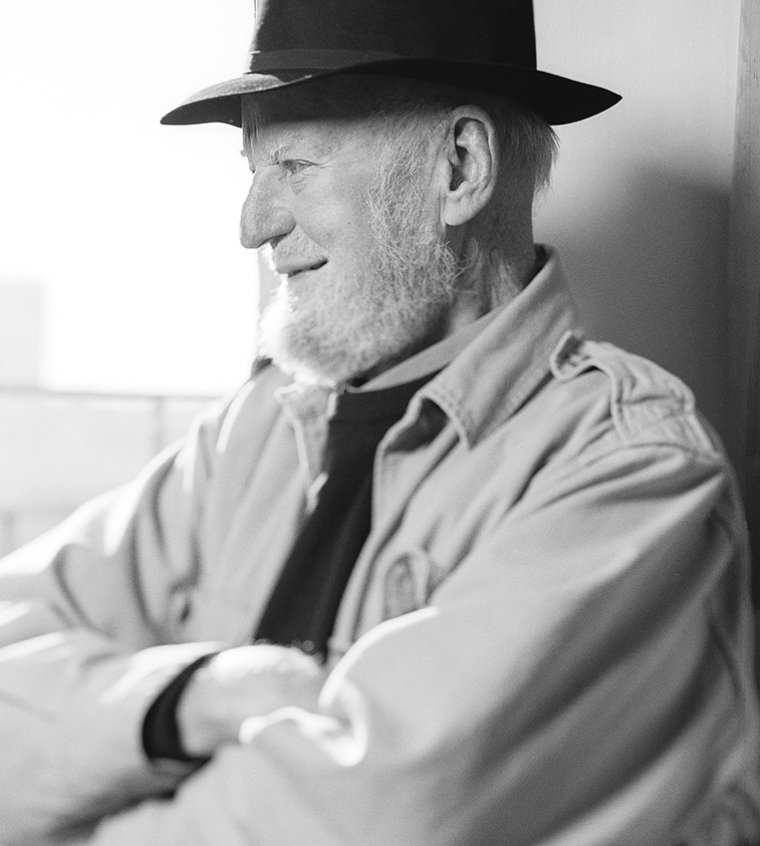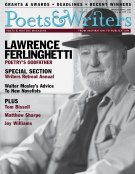Didn’t your father come from that same area?
Yes, I found his birthplace in northern Italy in Bresia just last year. My mother grew up in Providence, Rhode Island, but her mother was born in Lille, [France]. Her name was Mens Monsanto—a Sephardic Jewish family. In fact, I spoke French before English. My mother had five sons. Just before I was born, my father died. My mother had a nervous breakdown and couldn’t take care of me, so she handed me off to my Aunt Emily, who was French. My aunt took me to Strasbourg when I was about a week old, and I stayed there until I was four or five years old.

In 2001 Mary and I both were at a Pound conference in Hailey, Idaho, organized by Jennifer Wilson, the head of the Pound Society. She had restored his birthplace—a small Victorian house—at her own expense. They had this international conference and I went. Mary de Rachewiltz came from her castle in Brunnenburg. I was onstage with my dear friend Robert Creeley—the last time I saw him before he died—and Hugh Kenner. I had spent months reading Hugh Kenner’s book The Pound Era so I could converse with him. Trouble is, Kenner is practically deaf, and he often turned off his hearing aid—so there was no exchange at all!
I knew Mary was in the audience and that she was upset about my views on Pound. So I made a speech saying Pound was against U.S. war-making imperial policies. And though he blamed it on the bankers, who he said were all Jews, he was an antiwar protester. When he went on the Fascist radio in Rome, he said no more than lots of us are saying these days. We’ve said things that could be called just as un-American and treasonable as Pound said back then. Mary was satisfied with that and invited me to come visit her in Brunnenburg.
This is why I was at Spoleto, because I knew it was important. I was a very young poet then, but the controversy was raging.
Oh yes, and it has been going on since St. Elizabeths.
BACKSTORY: The three years I lived and studied in Italy, I often drove through Pisa. One day I stopped at a line of six-by-six-foot wire cages at the abandoned U.S. detention compound where Pound had been imprisoned for broadcasting pro-Fascist, anti-American poems and polemic. Eventually, he was pronounced “paranoid and unfit to advise with council” and was detained thirteen years at St. Elizabeths Hospital in Washington, D.C., before Archibald MacLeish, Robert Frost, and others sprang him from the mental ward.
At the Spoleto Festival, I was befriended by a Swedish writer named Anders Österling; he had translated the work of Nobel Prize–winning poet Salvatore Quasimodo. As we sat on the piazza, I kept looking at the clock. “Don’t worry,” Österling said. “Last year Direttore Menotti literally had to phone the poets to remind them we were waiting! Then Communist Evtushenko refused to participate while Pound was in the theater.” Österling showed me a Newsweek article with the gesticulating Soviet poet (whom Ferlinghetti called “the discus thrower of Smolensk”). Menotti told the reporter: “I’d rather handle a hundred opera divas like Maria Callas than ten poets.”
Inside the theater we waited for the Soviet poet Yevgeny Vinokurov. After five minutes of Vinokurov’s wild Communist ranting away from the microphone, the translator dropped out. But we kept the headphones on, silence being preferable to the poet’s relentless shouting. The flamboyant Soviet was striding toward the wings as Pound shuffled out in a black suit and stiff white collar. Suddenly, Vinokurov turned and lunged at the frail eighty-one-year-old poet. Pound tottered and grabbed for the wobbling stand-up microphone. Vinokurov stormed past Menotti, who had raced between them to a surge of applause. It was a reading (like Ferlinghetti’s) I’ll never forget.
While in Italy I used to write on trains—
Traveling in trains is always good for writing.
—and the San Miguel Review published a manifesto from your “Mexican Journals” that you wrote on a bus from Guadalajara in 1969. I was on a fellowship at the Instituto Allende at the time. Did you have time to paint while you were in Mexico? Or does the painting come when you have more space and can get into your studio?
Yes, it does. But there’s much too much emphasis in all the arts on the method and technique rather than on the subject matter.
On process, right?
Yes, everybody wants to know the process.
Right—like—“Do you do it with a number 2 pencil?”
In the academic world that’s what they want to know. I just read at the University of California, Santa Barbara. In the class before the reading they started asking these questions, and I said—“Well, that’s a trade secret.” That took care of that. Then they wanted to have a question and answer session after the reading. I said, “Do you ask a folk singer to explain his songs?” A poetry reading builds up to a climax, and if it’s a success it leaves the audience somewhat high. If you have a Q&A session it brings it all down to process. So we didn’t have one.
Along the same lines, what do you think of workshops? When I was in college, there were the Black Mountain Poets and the Iowa Writers’ Workshop—but that was about all. Now you have so many workshops it seems like an obsession.
Poets in small towns like Hailey, Idaho, feel they have no one to talk to about poetry. Everyone’s watching football on TV. So the poetry workshop serves a wonderful purpose for lost souls trying to find themselves in poetry. But if you’re in a big city, you don’t need it. I think it’s better for poets to stay away from poetry workshops. I mean, in a place like San Francisco there are so many poetry readings going on—practically every night there’s one.
And do you think a poet can learn a lot just by reading poetry?
Yes, it’s much better just to read it. And then I think—can you imagine Keats or Shelley going to a poetry workshop?
Or Dante. By the way, did you know D. H. Lawrence?
Oh no. I’m only eighty-seven! He was an earlier generation than me.
Yes, I think Lawrence must have been in Taos, New Mexico, in the late ’20s.
I lived on a commune northwest of Taos for a brief period in the early ’70s, I think it was, and I got hepatitis because we built the outhouse too close to the stream. We were city boys, you know. But the D. H. Lawrence ranch is close to Taos. Have you been there?
No, but Lawrence is a favorite writer of mine and I’ve read your poem about him.
Yeah, “The Man Who Rode Away.”
It seems like New Directions, Unicorn, Black Sparrow, and North Point all used to take risks on experimental and nonconventional poetry. Do you know of any new presses today willing to fill that void?
I don’t know. New Directions no longer publishes the annual anthology, and it’s a different world now. The day of the great literary annuals and quarterlies is past. There’s nothing like the old Partisan Review. Do you remember the one published in Italy called Bottega Oscura?
Yes, Salvatore Quasimodo gave me a copy.
Bottega Oscura was actually an old shop in an alley in Rome where the Communist Party had its headquarters. The anthology was two inches thick and was financed by Signora Caetani, who was a wealthy Roman woman. There were four or five languages in each issue without translation. Europeans are used to that. When you go to an international conference in Europe, they’re attended by literary persons pursuing literary careers. It’s assumed you know at least two or three languages and that you really know them—not just the way an American PhD does.
Translation is so important. Here, the mega-presses—and even the so-called “independent” literary ones—don’t offer exciting original poetry in translation.
I’ve been to conferences where everything was in English because Americans didn’t know any other languages. I went to a big conference in Florence like that once. Joseph Brodsky, the Russian poet who won the Nobel Prize—he’s dead now—he and I were asked to read in Naples at this huge convent building. He read first, got up, and walked out of the hall. I thought it was really arrogant. In this country you stick around and listen to the other readers.
That is strange. But to fast-forward to the home front—was your experience as San Francisco poet laureate a good one? I read somewhere that you used it as a sort of bully pulpit for the people.
Oh yes. There are no defined duties. You just do what you want. I was the first, and now Jack Hirschman is the poet laureate. He’s a populist poet and a great communicator.
Didn’t you get some streets named after San Francisco authors?
That was for the fifteenth anniversary of City Lights. We changed the names of a dozen streets to literary names. Now there’s a Jack Kerouac Street, William Saroyan Plaza, Mark Twain Plaza.…
BACKSTORY: Ferlinghetti’s unflagging enthusiasm for innovative community-based literature and art won him early recognition in Europe. When he was eighty-four years old the United States began catching up, awarding him the Frost Memorial Medal and an Author’s Guild Lifetime Achievement Award, and electing him to the Academy of Arts and Letters. In 2006 the New England Poetry Club presented him the Golden Rose Award. But most important, he’s more active than ever as a poet-painter-publisher. In November I talked to him just after the opening of his Word Play show. The next time we talked he had presided at the San Francisco Commonwealth Club Celebration for fifty years of the publication of Ginsberg’s Howl. In addition to his obligation as the publisher of Howl on Trial, which came out at the same time as the gala, he was active with the national media coverage. Yet, after a day that would tire a teenager, he sounded focused, congenial, and engaged.
I do like the new poems you read at Harvard.
I read “History of the Airplane,” which is an oral message. And then I believe I did the ecological one with bird cries in the background and “Casino Culture” to a soundtrack of “America the Beautiful.”
Do you think poetry has a role or place of some kind in the United States?
Definitely. When I’m interviewed by the national media, sometimes I get a question like, “How does it feel to be sidelined by the dominant culture?”—by which they mean TV and the mass media. I always say, “Well, you may be the dominant culture, but you’re not the mainstream culture. The mainstream culture is made up of the writers, the readers, the artists, the professors, the teachers, the librarians, the publishers, the editors, and everyone else in the literary world. We’re the mainstream culture.”
D’accordo! We, the people.
So I end up by saying, “When global warming is no longer a hypothesis, the electricity goes off, and electronic civilization fades away, we will be left—our culture. It could happen any second.”
Julia Older’s twenty-five titles include ten poetry collections, a verse play, and the book-length poem Hermaphroditus in America (Appledore Books, 2000). Her translation Blues for a Black Cat, stories by French author Boris Vian, was published by University of Nebraska Press in 2000. Currently she is at work translating Persian ghazals. This year her books Tahirih Unveiled and Tales of the François Vase are being published by Turning Point Press, as well as This Desired Place, the second novel in The Isles of Shoals Trilogy, from Appledore Books. She writes full-time in southern New Hampshire.








